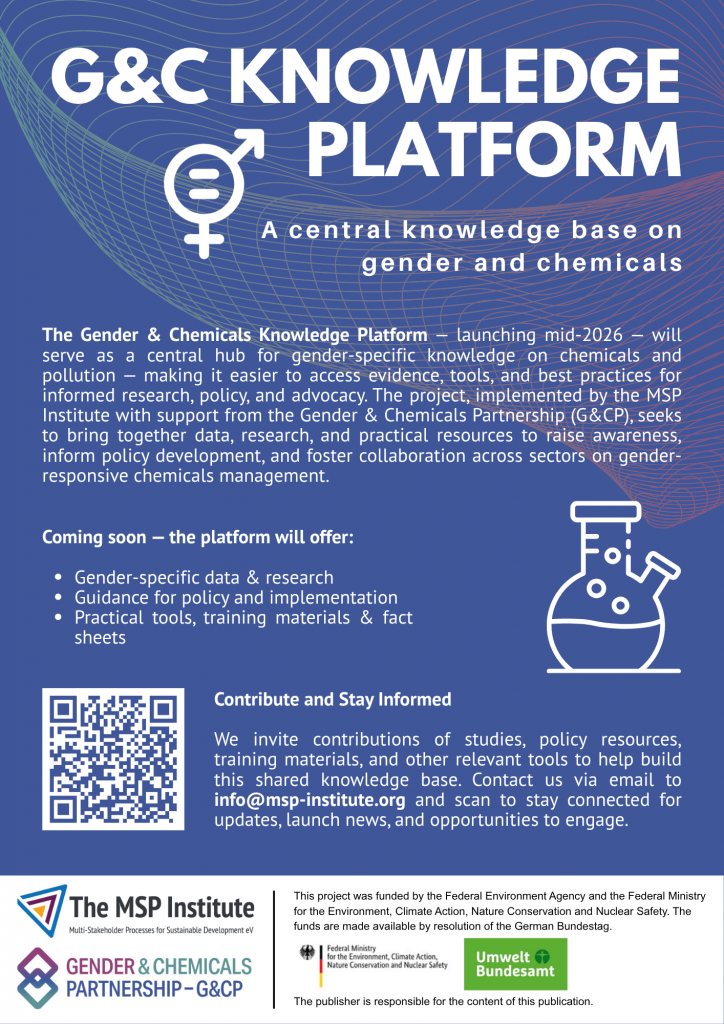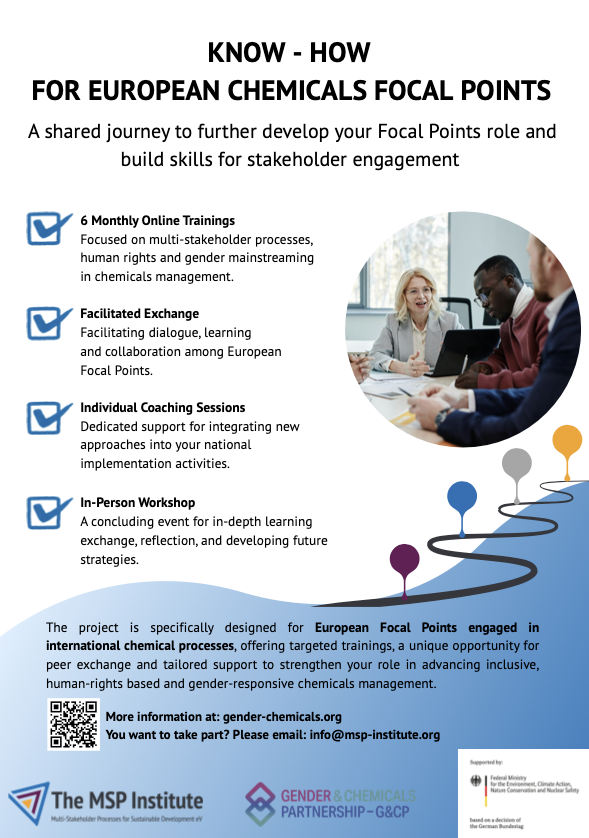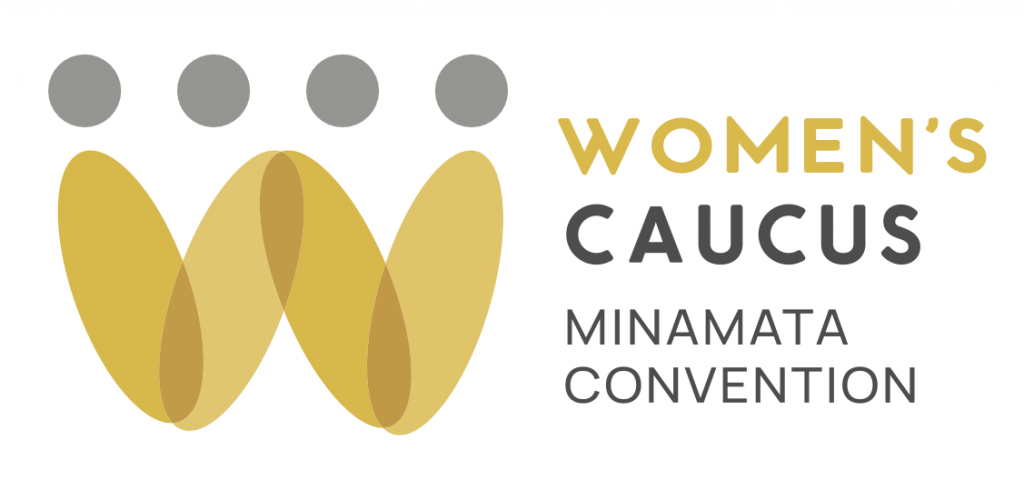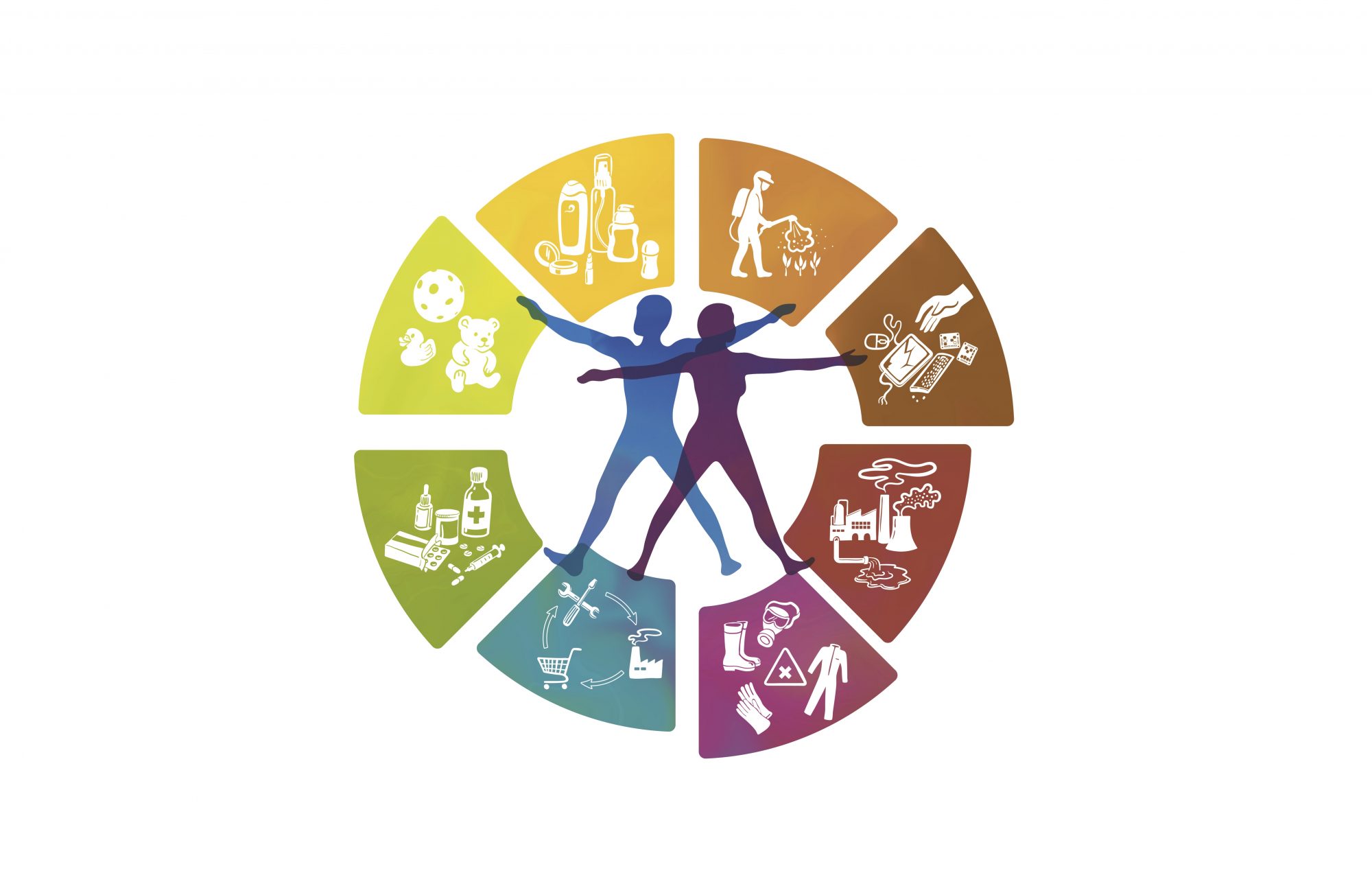MSP Institute issues an occasional newsletter about gender and chemicals. It contains updates from our project work, as well as information from the broader gender and chemicals community and international chemicals and waste management policy processes, especially SAICM.
Sign up for our newsletter “Gender and Chemicals”.
We use the newsletter program Newsletter2Go. If you have any questions regarding our data policy, see our data protection policy or write to us. You can unsubscribe from this newsletter at any time by using the link in the newsletter email.
You can also contact us if you would like to contribute a piece for the next newsletter edition.
Winter Newsletter 2025:
As winter settles in and the year draws to a close, the MSP Institute is pleased to reflect on recent progress and share updates from across our work. From ongoing initiatives and new projects to global engagement and strengthened partnerships, we continue to advance gender-responsive chemicals management – alongside our partners and allies.

G&CP Updates: Second G&CP Assembly & Developing our Theory of Change
Catch up updates and how to get involved at the G&CP Website.
Membership:
The Gender & Chemicals Partnership (G&CP) continues to expand – with currently 25 members. We warmly welcome new members from across regions and sectors: the African Transformation on Environmental and Health Action (Athea), Pan African Vision for the Environment (PAVE), the Tanzania Plant Health and Pesticides Authority and several individual experts. You can find a list of all partners here.
Working Groups:
Our four Working Groups – Data & Information, Education & Training, National Level GFC Implementation, and International Policy Processes – continue to meet regularly; are developing key outputs aligned with the Partnership’s strategic objectives, and support our main projects.
Second G&CP Assembly:
The second Assembly of the G&CP was held on 18–19 November 2025 as a virtual meeting, bringing together 23 representatives from governments, international organizations, civil society, academia and the private sector. The Assembly marked an important milestone following the formal establishment of the Partnership in November 2024.
Theory of Change Development:
Since August 2025 the G&CP is developing its Theory of Change in a joint process, financially supported by its partner ISC3, and using tools developed by Partnerships2030. Inital steps included an impact-narrative workshop in October led by Partnerships2030. The finalization is planned for January / February 2026 with process support from Marcus Andreas. The Theory of Change will inform both the future work planning and the fundraising efforts of the G&CP.
Side Event at UNEA-7:
December 11, 2025, the side event “Gender and Chemicals in Focus: Turning Global Commitments into Local Impact” was held at the United Nations Environment Assembly (UNEA-7) in Nairobi. Organized by G&CP Partners ZDHC, ISC3, W4B, Chemichemi Foundation and the Indira University, this event brought together key stakeholders to discuss gender considerations in international processes on chemicals management and to present gender-responsive implementation activities at the local level.

New Project: Development of a Knowledge Platform on Gender and Chemicals
Since September 2025 the MSP Institute has started with its project “G&C Knowledge Platform”. The project aims to create a new platform that brings together research, gender-specific data, and practical tools on the links between gender and chemicals.
The MSP Institute implements the project with the support of the Gender & Chemicals Partnership (G&CP), particularly its Working Group on ‘Gender Data & Information’.
The project is funded by the German Environment Agency (UBA) and the German Federal Ministry for the Environment, Climate Action, Nature Conservation and Nuclear Safety (BMUKN).
We invite contributions of studies, policy resources, training material, and other relevant tools to help build this shared knowledge base.
More information are available here.

Project Update: Know-How for European Chemicals Focal Points
Through trainings on stakeholder engagement, multi-stakeholder processes and gender-responsive chemicals management, the project strengthens expertise and collaboration among European Chemical Focal Points.
So far the following project steps have been realized:
– Development of a needs assessment
– Conducting an information webinar in July 2025
– Conducting three virtual trainings for European Focal Points
The MSP Institute is supported by the Gender & Chemicals Partnership (G&CP), particularly the G&CP Working Group on ‘Education & Training’, in its various activities aimed at achieving the project outputs.
The project is financially supported by the European Environmental Initiative (EURENI) of the German Federal Ministry for the Environment, Climate Action, Nature Conservation and Nuclear Safety (BMUKN).
More information are available here.

Minamata COP-6: Launch Event of the new Women’s Caucus of the Minamata Convention
In collaboration with Women4Biodiversity, and with the support of the Minamata Secretariat, the MSP Institute organised a launch event of the new Women’s Caucus of the Minamata Convention during Minamata COP-6 in November 20205. The new Women’s Caucus serves as a space to advance gender equality and the empowerment of women within the implementation of the Minamata Convention on Mercury. Membership is open to all interested individuals, representatives of communities and civil society organizations (CSOs) working in the field of women and mercury.
Watch the recording of the launch event here. Learn more about the Women’s Caucus and register here.
Further Activities and Projects We Aim to Implement
- Organizing the first international conference on gender and chemicals
- Conducting gender-focused trainings in chemicals management
- Developing national gender action plans for chemicals policy
- Enhancing women’s participation and gender expertise in international policy processes, including through the provision of travel support
👉 We are currently seeking funding opportunities to make these initiatives a reality. If you are interested in supporting our efforts, or can suggest potential funding sources, we would be delighted to hear from you!
We thank you for your kind support and interest in our work for a gender-responsive chemicals management!
We wish you happy holidays!
The MSP Institute eV
